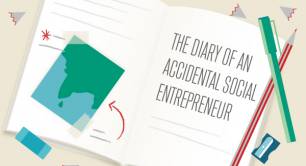The ludicrous luxury of purpose. Do you buy it?
Purpose. Are you searching for it, have you found it? Or is it really a mirage created by a modern society that can afford to look beyond basic subsistence? For Helen Trevaskis one thing is certain, there's a mad search on, and we're trying a bit too hard to find it.
A few months back, a super smart former BBC exec I’d told about our start up, described me in passing as having “a purpose”, which irked me. Since then I’ve been trying to work out why.
Purpose is everywhere. Increasingly I’m encountering friends or friends of friends or colleagues struggling with career hollowness – searching for meaning. At 3C we’re getting investor ready which means sharpening what we are doing and what we stand for, and conversations involving the ‘p’ word. Out there it’s hard not to trip over articles, leaders, organisations vying to help you find your place in the ‘Purpose Economy’. I’d struggle to argue any of this is wrong, so why am I so bugged by the notion of having a purpose?
Well, it’s not the notion of organisational purpose. I believe that after they reach a certain size organisations function better if they have a reason for existence that’s simple, understood and ambitious yet useful. It can facilitate better day-to-day decision-making, encourage taking the long-view and provide competitive edge. I also believe that purpose should be ‘good’ or at least not ‘bad’ – to help elevate activity above moneymaking and the marketing of ‘stuff’. Clearly this gets tricky if you’re an arms dealer or flogging nutritionally empty fizzy drinks, but that’s the point - a purpose should make organisations try harder.
But people are not organisations and personal purpose is different.
I marvel at the talent we humans have for inventing almost-impossible-to-achieve ideals we then attempt to contort ourselves into. I blame higher-level consciousness. When survival and procreation are no longer all consuming, culture manufactures concepts to keep us striving and aspiring. In the past these were likely to be shared societal mores like engineering a good marriage, living a Christian life, not bringing shame on the family. Nowadays there’s a plethora of ephemeral goals to buy into but whether it’s everyday mindfulness or your own ‘Victory V’ you’re after, disappointment in pursuing the unachievable or the unsustainable is part of the deal.
So, is my discomfort more of a concern? A concern that seeking a purpose is another conceptual stick we beat our existential selves with, not a step toward career enlightenment?
Nine years ago this was highly relevant to me. Worn out, I’d left agency life to freelance but quickly found the independence and a hefty wage-hike only provided a temporary high. So I started looking for something more. I toyed with starting a new career – I’ll design furniture, I’ll write a science fiction novel, I’ll become an art therapist! I did a Masters with people half my age. I planned to move to Paris. I tried defining my USP to the point where it was so polished and perfect I was in danger of never finding work again. I said ‘no’ to things I normally did and ‘yes’ to things I didn’t. I spoke to people who seemed to have it sussed. I bought books. I even read some.
It drove me nuts! Where was my purpose? Why couldn’t I find it! What a failure I must be!? Aaron Hurst entrepreneur and purpose guru says about himself, “Like so many people, I always thought that gaining purpose was about finding my cause” – I suffered from this too.
So, finally I stopped looking for ‘it’ and thought instead about the better moments of my work and what made them better. There turned out to be three things. 1) Working with smart, nice people I could also have a laugh with; 2) Avoiding doing things the same way time after time to keep things interesting; 3) Choosing projects with something worthwhile about them where pragmatic, where possible. And over time, slowly, slowly these broad unremarkable steers helped evolve my career into something that I feel good about, most of the time, and enjoy, most of the time.
It’s a ludicrous luxury to think about any of this, but perhaps finding purpose is simply a trick – like squinting at a dilapidated building to imagine for a second how it would look after a £20,000 freshen-up – and about finding ways to feel just a little more purposeful each day rather than chasing a Damascene moment.



